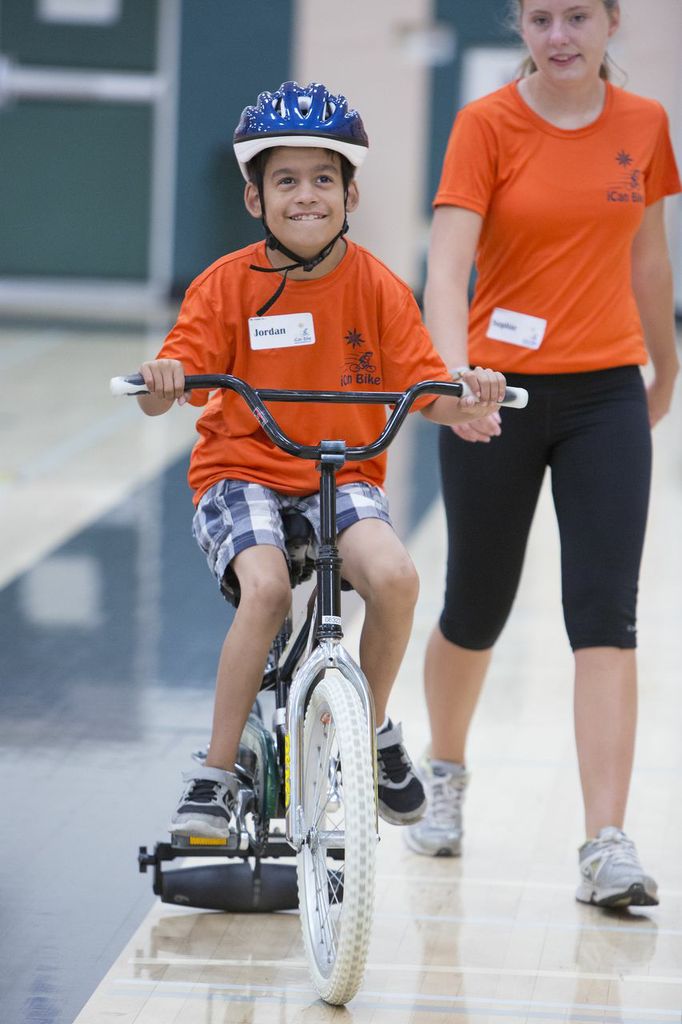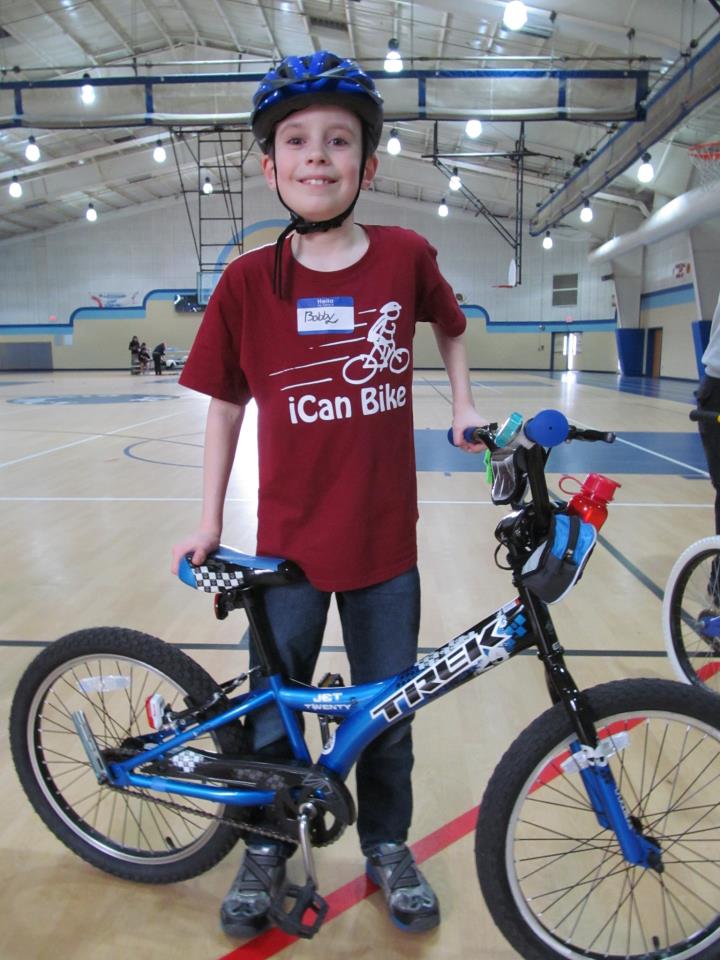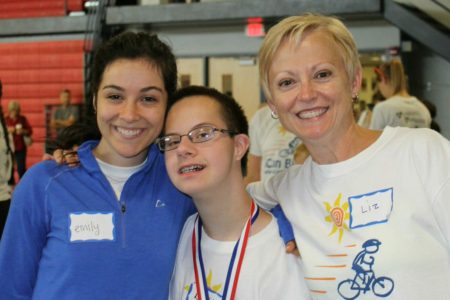How Our Bike Program Works
Years of research, months of planning by your local bike camp host and hours of volunteer ‘spotting’ by wonderful, concerned people from your community lead to your child attaining confidence to last a lifetime – achieved in just 5 days. At our iCan Bike programs, riders learn to balance, pedal, steer and take off on their own, many in five days or less – a feat parents say is miraculous. We encourage you to read our many testimonials.
We adapt our approach to each individual rider based on the accommodations they may need to benefit the most from our program. Our staff are well-trained and experienced in working with many different types of disabilities and behavioral challenges. We stock all our fleets of bike equipment with ‘tricks of the trade’ motivational tools that we find are often successful to motivate riders to participate and succeed.
Two volunteers are assigned to each rider to serve as their ‘spotters’ providing physical support, motivation and encouragement throughout the week. While all individuals learn at their own pace, some will be ready to ride on two wheels as soon as the third day, and historically approximately 80% of the individuals who participate in iCan Bike ride a two-wheel bicycle independently (at least 75 feet with no assistance) by the end of our five day program. The remaining 20% make tremendous progress towards this goal and leave our programs accompanied by family members trained as ‘spotters’ to pick up where we leave off!
Generally speaking, we try to establish early on at our iCan Bike programs that learning to ride is fun but serious business. We use a ‘kind yet firm’ approach so that riders cooperate with the program protocol. We take a team approach whereby we collaborate with parents for their advice and tips on how to most successfully work through any behavioral difficulties presented by their rider.
Benefits of Riding a Bicycle
Our program works! Success rate of riders independently riding a bicycle (at least 75 feet with no assistance) by the end of our iCan Bike programs is approximately 80% and all riders progress and gain skills during the week with benefits including:
-
- Increase in self-esteem and confidence spills over into many other aspects of their lives
- Positive changes in family dynamics
- Inclusion opportunities
- Independent transportation
- Increase in recreation that improves physical fitness, mental health and overall quality of life
Requirements for Participation
To ensure the safety of our riders and the best use of our limited resources we have established certain criteria that all riders must meet to be eligible to attend an iCan Bike program. The rider must:
-
- be at least 8 years old (no upper age limit)
- have a disability
- walk without an assistive device (e.g., walker or cane)
- be able to side step swiftly to both sides
- be able to wear a properly fitted bike helmet at all times when on a bicycle
- have a minimum inseam measurement of at least 20” when measured from the floor wearing sneakers
- not exceed 220 lbs.
 Riders Need a Bike
Riders Need a Bike
All riders must have an appropriate personal bike bought to and available for the iCan Bike program by no later than Thursday (Day #4) of the program. Our goal is to transition all riders to their personal bike towards the latter part of the iCan Bike program such that they are comfortable with the bike they will be riding at home after day #5.
Also, to retain and sharpen their newly learned bike riding skill, it is very important that each rider spend at least 15 minutes bike riding each of the three days immediately following camp. Research shows that for each of the three days immediately following camp that a rider does not ride at least 15 minutes, the chances of losing this valuable skill increases by approximately 10%.
Bike and Helmet Videos
Parents may or may not have an appropriate bike or helmet available. The two videos below are designed to help guide parents through the process of identifying a suitable bike and bike helmet for their rider (total video run time is less than 13 minutes):
Parent Documents
Parents may need some tips on how to purchase an appropriate bicycle and helmet and best support their rider before, during and after bike camp. Here are some helpful documents:
-
Post iCan Bike Spotting Tips - SPANISH Version
Overview of spotting tips for families to follow when spotting a rider after having attended bike camp - EN ESPANOL
-
Selecting the Right Bike & Helmet - SPANISH Version
Overview for parents of important considerations when identifying an appropriate bike and helmet for a rider with a disability, including our list of suggested bikes for learning by size and make/model - EN ESPANOL
Please see the 'Canadian Recommended Bike List' (presented above) if you live in Canada
-
Post iCan Bike Riding Tips - SPANISH Version
Overview for families to follow when implementing post bike program riding strategies - EN ESPANOL
-
How Parents & Guardians Can Help - SPANISH Version
Overview of suggestions for parents and guardians to consider to make the iCan Bike program a positive and successful experience for their rider - EN ESPANOL
-
Selecting the Right Bike & Helmet (includes Recommended Bikes List)
Overview for parents of important considerations when identifying an appropriate bike and helmet for a rider with a disability, including our list of recommended makes and models of bikes for learning by size and make/model.
Please see the 'Canadian Recommended Bikes List' (presented above) if you live in Canada
-
Post iCan Bike Riding Tips
Overview for families to follow when implementing post bike program riding strategies
-
How Parents & Guardians Can Help
Overview of suggestions for parents and guardians to consider to make the iCan Bike program a positive and successful experience for their rider
-
Post iCan Bike Spotting Tips
Overview of spotting tips for families to follow when spotting a rider after having attended bike camp
-
Dr. Klein's Home Remedy for Struggling Riders
Overview for parents working with riders that did not attend an iCan Bike camp or did attend camp but are still struggling to learn to ride a bike
-
Canadian Recommended Bikes List
Our list of recommended makes and models of bicycles by size for people with disabilities available for purchase in Canada.
-
Social Stories, without pictures
Compilation of our four social stories, without pictures, designed to comfort and help set riders' expectations for participating in our iCan Bike program.
-
Social Stories, with pictures
Compilation of our four social stories, with pictures, designed to comfort and help set riders' expectations for participating in our iCan Bike program.
-
Day-By-Day Overview of Bike Camp
Summary of what occurs and what to expect each day during the bike program week


